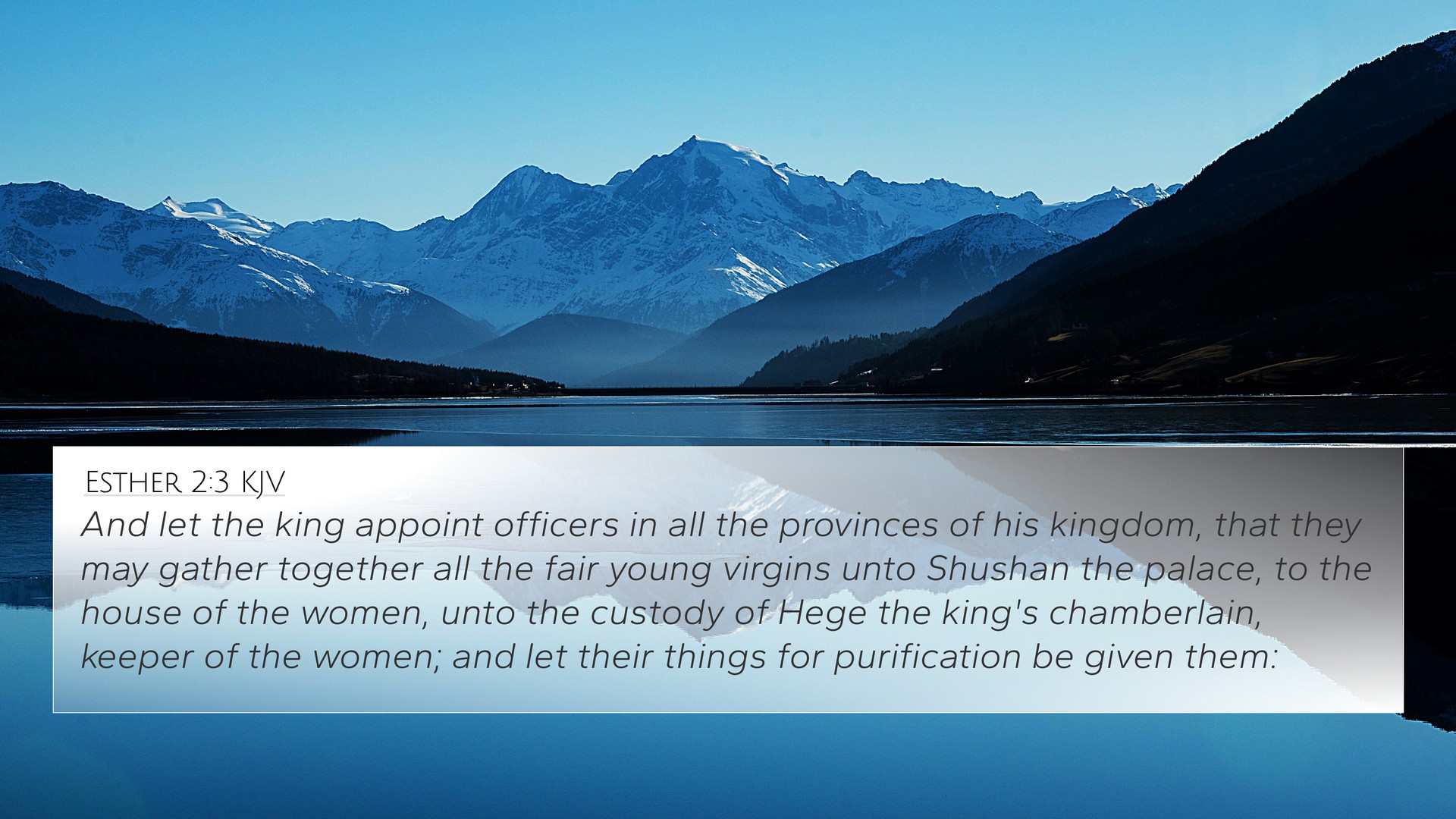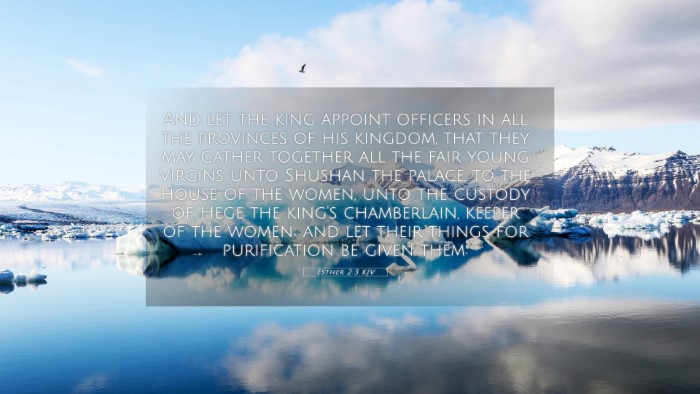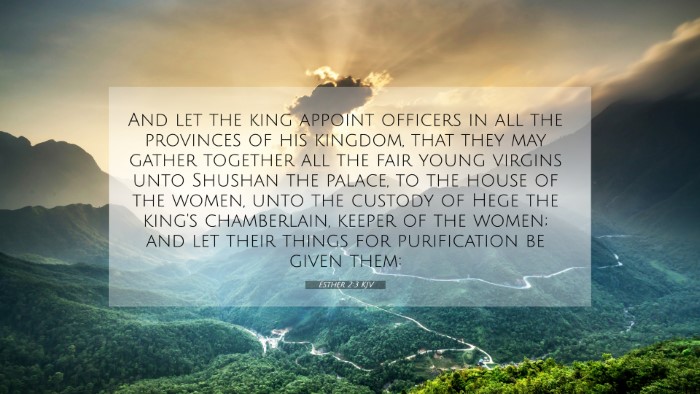Old Testament
Genesis Exodus Leviticus Numbers Deuteronomy Joshua Judges Ruth 1 Samuel 2 Samuel 1 Kings 2 Kings 1 Chronicles 2 Chronicles Ezra Nehemiah Esther Job Psalms Proverbs Ecclesiastes Song of Solomon Isaiah Jeremiah Lamentations Ezekiel Daniel Hosea Joel Amos Obadiah Jonah Micah Nahum Habakkuk Zephaniah Haggai Zechariah MalachiEsther 2:3 Similar Verses
Esther 2:3 Cross References
And let the king appoint officers in all the provinces of his kingdom, that they may gather together all the fair young virgins unto Shushan the palace, to the house of the women, unto the custody of Hege the king's chamberlain, keeper of the women; and let their things for purification be given them:
Uncover the Rich Themes and Topics of This Bible Verse
Listed below are the Bible themes associated with Esther 2:3. We invite you to explore each theme to gain deeper insights into the Scriptures.
Esther 2:3 Cross Reference Verses
This section features a detailed cross-reference designed to enrich your understanding of the Scriptures. Below, you will find carefully selected verses that echo the themes and teachings related to Esther 2:3 KJV. Click on any image to explore detailed analyses of related Bible verses and uncover deeper theological insights.
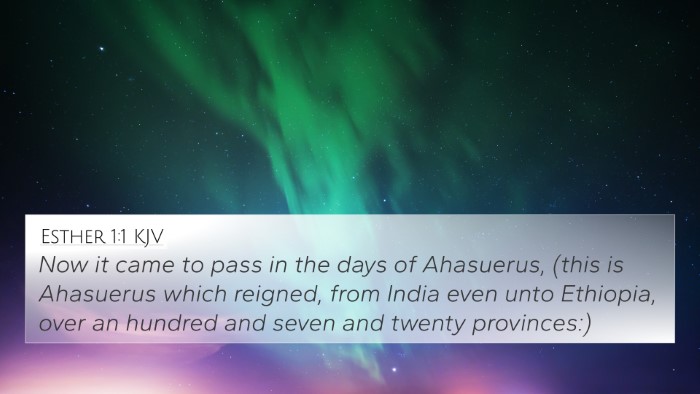
Esther 1:1 (KJV) »
Now it came to pass in the days of Ahasuerus, (this is Ahasuerus which reigned, from India even unto Ethiopia, over an hundred and seven and twenty provinces:)
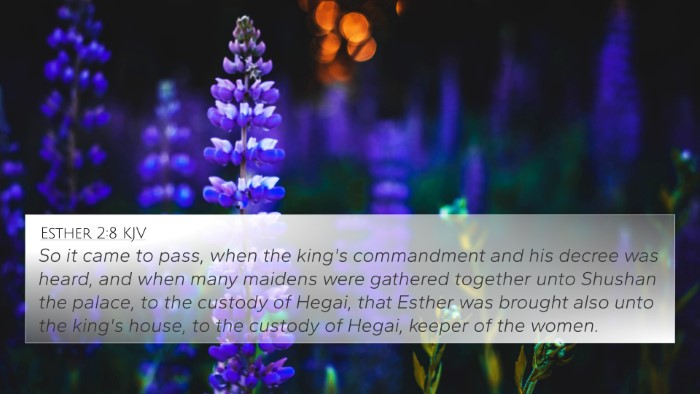
Esther 2:8 (KJV) »
So it came to pass, when the king's commandment and his decree was heard, and when many maidens were gathered together unto Shushan the palace, to the custody of Hegai, that Esther was brought also unto the king's house, to the custody of Hegai, keeper of the women.
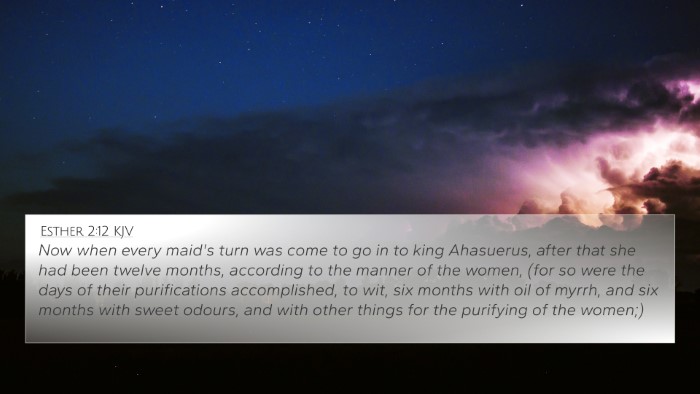
Esther 2:12 (KJV) »
Now when every maid's turn was come to go in to king Ahasuerus, after that she had been twelve months, according to the manner of the women, (for so were the days of their purifications accomplished, to wit, six months with oil of myrrh, and six months with sweet odours, and with other things for the purifying of the women;)
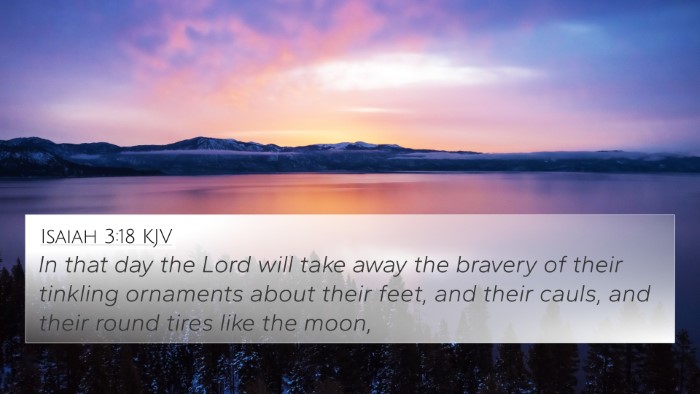
Isaiah 3:18 (KJV) »
In that day the Lord will take away the bravery of their tinkling ornaments about their feet, and their cauls, and their round tires like the moon,
Esther 2:3 Verse Analysis and Similar Verses
Understanding Esther 2:3
Esther 2:3: "And let the king appoint officers in all the provinces of his kingdom, that they may gather together all the fair young virgins unto Shushan the palace, to the house of the women, unto the custody of Hege, the king’s chamberlain, keeper of the women; and let their things for purification be given them."
This verse introduces the scenario in which King Ahasuerus seeks to select a new queen from among the young women of his kingdom, setting the stage for Esther's rise to prominence. Various commentaries provide insights into its meanings and implications.
Commentary Insights
-
Matthew Henry:
Henry emphasizes the providential hand of God in the events described, suggesting that this process, while seemingly arbitrary, is part of a divine plan. He notes the king's desire for beauty and how this reflects the human inclination to judge by outward appearance.
-
Albert Barnes:
Barnes highlights the significance of the term "fair young virgins," pointing out that purity and beauty were crucial criteria in the selection process. He comments on the cultural context, noting that such practices were typical in ancient monarchies, reflecting the opulence and nature of royal courts.
-
Adam Clarke:
Clarke gives attention to the logistics of the king's command and the role of Hege, suggesting that this chapter marks a pivotal turning point in the lives of many women, illustrating both the power dynamics of the time and the hope of divine intervention in dire circumstances.
Cross-References
Esther 2:3 has various cross-references that enrich our understanding and connect it to broader Biblical themes:
- 1 Samuel 8:16: Describes the practice of monarchs taking the best of the people for their service, highlighting the power dynamics similar to that of King Ahasuerus.
- Daniel 1:3-4: God’s selection of the best young men for royal service in Babylon resonates with the theme of youth and beauty in Esther’s selection.
- Proverbs 31:30: Discusses the value of a woman, not just in physical beauty but in the fear of the Lord, contrasting the King’s choice based on earthly standards.
- Genesis 24:14: Eliezer’s search for a bride for Isaac reflects a similar quest for a suitable spouse based on specific characteristics.
- Song of Solomon 1:8: An exaltation of beauty in women, providing a poetic linkage to the aesthetics appreciated during Esther’s time.
- Matthew 22:14: "For many are called, but few are chosen." This reflects the process in Esther’s selection when divine choice plays a major role.
- 1 Peter 3:3-4: An admonition concerning inner beauty over outer adornment, taking into account the cultural emphasis on beauty found in Esther's time.
Literary and Theological Themes
Esther 2:3 illustrates key themes of:
- Divine Providence: The unfolding of God’s plan through seemingly mundane events.
- Beauty and Purity: The cultural values placed on physical attributes versus spiritual integrity.
- Power and Influence: The dynamics of kingly authority and its impact on the lives of individuals.
- Hope in Adversity: The promise of deliverance through Esther’s eventual rise as queen.
Thematic Bible Verse Connections
When studying Themes centered around Esther 2:3, readers can trace connections between the Old and New Testament:
- Linking God's choices in human affairs as evidenced in Esther with the New Testament theological perspective on God's election.
- Identifying parallels between Esther's rise and the role of women in Jesus’ ministry, such as Mary Magdalene’s significant position among the disciples.
- Exploring the motifs of purity and sacrifice in Esther with the teachings of selflessness shown throughout the Gospels.
Practical Applications
The insights gained from Esther 2:3 and its commentary can be applied in various ways:
- Understanding God’s sovereignty in our personal circumstances, encouraging individuals facing difficult times.
- Promoting the value of character over external appearances, guiding attitudes towards relationships.
- Utilizing Esther’s narrative as a case study on courage and action in the face of societal and personal pressures.
Conclusion
Esther 2:3 not only sets the stage for the events to follow in the Book of Esther but also provides fertile ground for theological reflection and personal application. The verse invites readers to engage with God’s unfolding narrative, drawing connections between Israel's plight and God's overarching plan of redemption as revealed throughout the biblical text.
